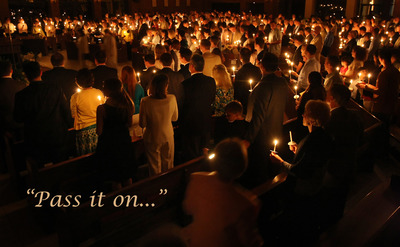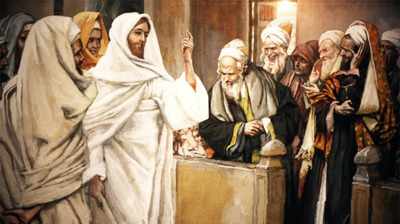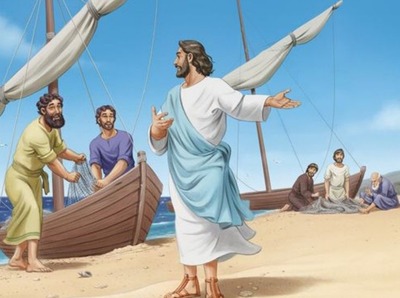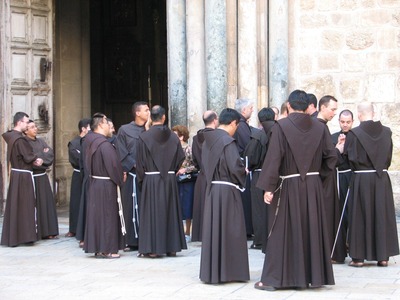December 31, 2023
|by N W
|
0 Comments
|
Christmas, Family, Father Nixon, Love, Mary, St. Joseph
Feast of the Holy Family of Jesus, Mary and Joseph
December 31, 2023 — Year B
Readings: Sir 3:2-6, 12-14 / Ps 128 / Col 3:12-21 / Lk 2:22-40
by Rev. Nixon Negparanon, Pastor
Our readings today from Sirach, Colossians, and Luke present a harmonious theme that revolves around the dynamics of family, relationships, and the virtues that foster a harmonious and godly life.
In Sirach, we are reminded of the honor and respect due to parents. The call to honor your father and mother is not just a cultural or societal norm but is deeply embedded in the divine order. It reflects a recognition of the role parents play in our lives and the wisdom they can impart. The passage also emphasizes the importance of kindness, which extends beyond familial relationships to the broader community.
The letter of Saint Paul to the Colossians provides a practical guide for Christian living within the context of family and community. The virtues of compassion, kindness, humility, gentleness, patience, and forgiveness are highlighted as essential for maintaining the unity and peace of the Christian community. Above all, the apostle Paul underscores the central role of love, which binds everything together in perfect harmony. The passage challenges us to live out our faith not only in public worship, but also in the intimate spaces of our homes and relationships.
The gospel reading from Luke introduces the presentation of Jesus in the temple and the devout figures of Simeon and Anna. Simeon, filled with the Holy Spirit, recognizes Jesus as the fulfillment of God’s promise and a light for all nations. Anna the prophetess adds her voice to the praise and thanksgiving. This encounter in the temple symbolizes the dedication of the Holy Family to God’s plan and the broader significance of Jesus’ mission for all people.
As we continue our journey through Christmas season, this feast of the Holy Family is an important celebration straight after the feast of the Nativity of the Lord and within the octave of Christmas.
There is a story of a man who tried to follow in the footsteps of Santa Claus by giving out gifts to strangers every Christmas. When asked why he wanted to be like Santa, he said, “I grew up in an orphanage. Every Christmas I visit homes and hand out gifts to children and adults alike with the hope that I would eventually find my parents, meet my family, or at least touch the hearts of other families.”
At this time of the year, we give sincere thanks for the love, nurturing, and support that our family can give us, and the love, example, and intersection that the Holy Family gives us on our journey through life. We think of our parents’ and family’s countless acts of kindness, love, and sacrifices. When we were young, we probably didn’t appreciate the scale of it all. When we get older and have our own families or watch with admiration our brothers and sisters and friends raising their own families, we start to appreciate what our parents must have given and sacrificed out of love, and we are truly grateful for this.
We are also very mindful of people whose family life has been extremely difficult, and who did not have that support that others take for granted. That is, not everyone in this world has been blessed with an unconditionally loving and accepting family who support one another.
We give thanks to mentors and all people who have been good role models and sources of care and protection for the young. These people have been family to others, beyond the ties of blood. We keep in mind currently families worldwide who’ve had it really tough this year, perhaps due to illness, distance, separation, financial hardship, and worries.
The Holy Family of Jesus, Mary and Joseph are the patron saints supporting each other and sticking together when everything is going wrong around them. For example, when we look closely at the very first Christmas, we quickly see that life for the Holy Family of Jesus, Mary, and Joseph was anything but smooth sailing.
The joy and hope of this celebration comes from the fact that God came into our world and made a home with us when everything was going badly for the world. The first Christmas came at a time of incredible unrest for the people of Israel who were suffering under the foreign domination of a pagan empire. They had values quite opposed to and different from many of the sacred religious values of the Jewish people.
Mary and Joseph are forced to take a terribly difficult trip to Bethlehem when Mary is imminently due to give birth. This would have been a difficult trip at the best of times, but it must have been extremely difficult for an expectant mother at the end of her term. They arrive at their ancestral hometown, and there is nowhere to stay. They are forced to sleep in a barn, and Mary gives birth to a baby surrounded by animals. The baby is placed in a food trough where the animals normally eat. The shepherds, some of the poorest and lowest outcasts in society, are the first to hear about the birth and come to pay their respects.
Mary and Joseph also had countless incidents when they had just to trust in what God was doing and all the while were plunged into confusion about what it all meant. They trusted in God and supported each other especially when things were unclear and did not make any sense to them, and this made all the difference.
The celebration of the Holy Family of Jesus, Mary and Joseph offers a poignant moment to reflect on the significance of family life and the virtues exemplified by the Holy Family. In contemplating the life of Jesus, Mary and Joseph, we find a model for love, unity, and faithfulness that resonates across the ages. At the heart of the Holy Family is a profound sense of love and sacrificial service.
Joseph’s unwavering commitment to Mary and Jesus, even in the face of uncertainty and challenges, speaks to the strength that comes from selfless love. In Mary, we see a mother who treasured and pondered the mysteries of her son’s life, embodying the qualities of contemplation and deep faith. Jesus, the son of God, chose to enter the human experience, growing up within the embrace of a human family.
This feast invites us to consider the sacredness of our own families and the responsibilities that come with it. In a world that sometimes seems to devalue the institution of the family, the Holy Family stands as a beacon of hope, and a reminder of the importance of cultivating love, respect, and unity within our own home.
As we reflect on the Holy Family of Jesus, Mary, and Joseph we are called to strengthen the bonds of love within our families, to prioritize faith in the face of challenges, and to embrace the sacredness of the family unit. Whether our families are nuclear or extended, biological or spiritual, the virtues embodied by the Holy Family of love, trust, and faithfulness, serve as a timeless guide for building strong and resilient families that reflect the love of God in our world.
May the Holy Family inspire us to cultivate holiness within our homes and to be a source of light and love for others. In a world often marked by division and discord, these readings offer a counter narrative of unity, love, and mutual support within the family and the Christian community. They challenge us to embody the virtues of Christ in our daily interactions, extending compassion and forgiveness to those closest to us and to the wider circle of humanity. As we celebrate the Holy Family, we strive to emulate their virtues, creating homes and communities that reflect the love and harmony of God’s Kingdom. The Holy Family is our inspiration and prayerful support.
At this fifth day within the Christmas season, we give sincere and heartfelt thanks for family, and the support and strength we can give each other along life’s long journey with all these joys and sorrows, graces, and temptations. Holy Family of Jesus and Mary and Joseph, pray for us. May Jesus Christ be praised.
KEEP READING
 540-586-8988
540-586-8988 










